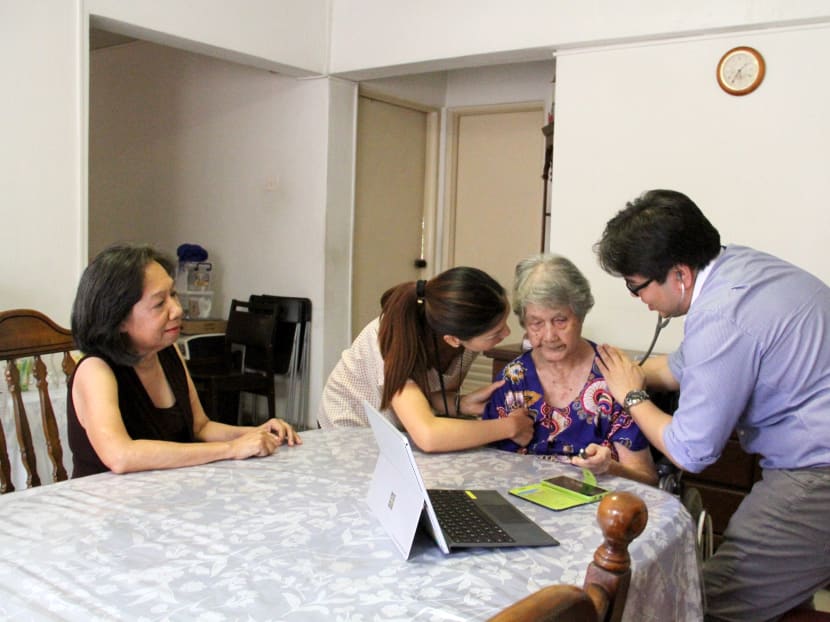Dover Park Hospice hoping to expand Programme Dignity
SINGAPORE — Dover Park Hospice is looking to expand its new home-based palliative care programme for advanced dementia patients with the National Healthcare Group (NHG) and other palliative home care providers, following a successful three-year-long pilot.

Programme Dignity allows end-stage dementia patients like Madam Monica Fernandez (second from right) to be cared for in the comfort of her own home. Photo: Esther Leong/TODAY
SINGAPORE — Dover Park Hospice is looking to expand its new home-based palliative care programme for advanced dementia patients with the National Healthcare Group (NHG) and other palliative home care providers, following a successful three-year-long pilot.
Programme Dignity, piloted in 2014, is a first-of-its-kind home care programme here specifically for end-stage dementia patients. The S$1.5 million pilot programme was jointly set up with Tan Tock Seng Hospital (TTSH) and funded by Temasek Foundation Cares.
The hospice will be working with the NHG to offer such care to end-stage dementia patients, and those with non-cancerous conditions, including end-stage kidney failure. “Together, we will expand home palliative care to other non-cancer terminal conditions and make (it) a viable choice for more patients,” said Dover Park Hospice chairman Lionel Lee on Thursday (Sept 21).
Dementia is on the rise as Singapore’s population ages. The disease affects one in 10 people aged 60 years and above, and one in two people aged 85 and above.
Under the programme, a home-care team — comprising nurses, doctors, medical social workers and allied health professionals — visits these patients about four times a month and develops personalised care plans, which can be adapted to a person’s changing needs.
The team also teaches caregivers to identify and manage symptoms such as breathlessness, pain and signs of distress. This is important as such patients are typically unable to articulate their needs, and instead express them through behaviours such as eating less. Should caregivers require help, the team is also available 24/7 to offer advice.
The programme has shown positive results: Patients’ hospital admission frequency decreased by more than 70 per cent, compared to before joining the programme. Visits to the emergency rooms also went down by more than 70 per cent. When these patients had to be admitted to the hospital, they would stay half the time that they used to.
Patients also saw their pain levels go down by almost a fifth, and quality of life improved by 16.7 per cent.
More than 370 patients took part in Programme Dignity from 2014 to this year, with 331 of them agreeing to be tracked. One participant is 90-year-old Monica Fernandez, who has had dementia for more than 20 years. Her daughter, Madam Dora Fernandez, 65, has been her full-time caregiver for the past decade.
After developing advanced dementia about two years ago, her mother could not walk anymore and had to take an ambulance to the hospital even for non-urgent visits. Now, the home-care team is able to take care of the elderly lady in the comfort of her home.
“I’m not so stressed worrying what to do now. If she doesn’t sleep for a few days, or if I don’t know what happened to her, the team can give us advice and adjust her medication,” said Mdm Fernandez.
Before the pilot, end-stage dementia patients would only receive palliative care designed for advanced-stage cancer patients in hospices and hospitals.
However, both diseases are not the same, and there were gaps in how end-stage dementia patients were cared for, said Dr Allyn Hum, a senior consultant of palliative medicine at TTSH and Dover Park Hospice.
“Advanced dementia was not widely acknowledged in Singapore as a terminal illness (such as cancer) ... When patients reach the final point in dementia, we found that a lot of healthcare professionals did not acknowledge that this is an area where palliative care needs to come in,” Dr Hum said. “I hope the programme can eventually be rolled out across the island.”
CORRECTION: An earlier version of this story said Programme Dignity was jointly set up with Tan Tock Seng Hospital and funded by Temasek Foundation Connects. That is incorrect. It is funded by Temasek Foundation Cares. We apologise for the error.








